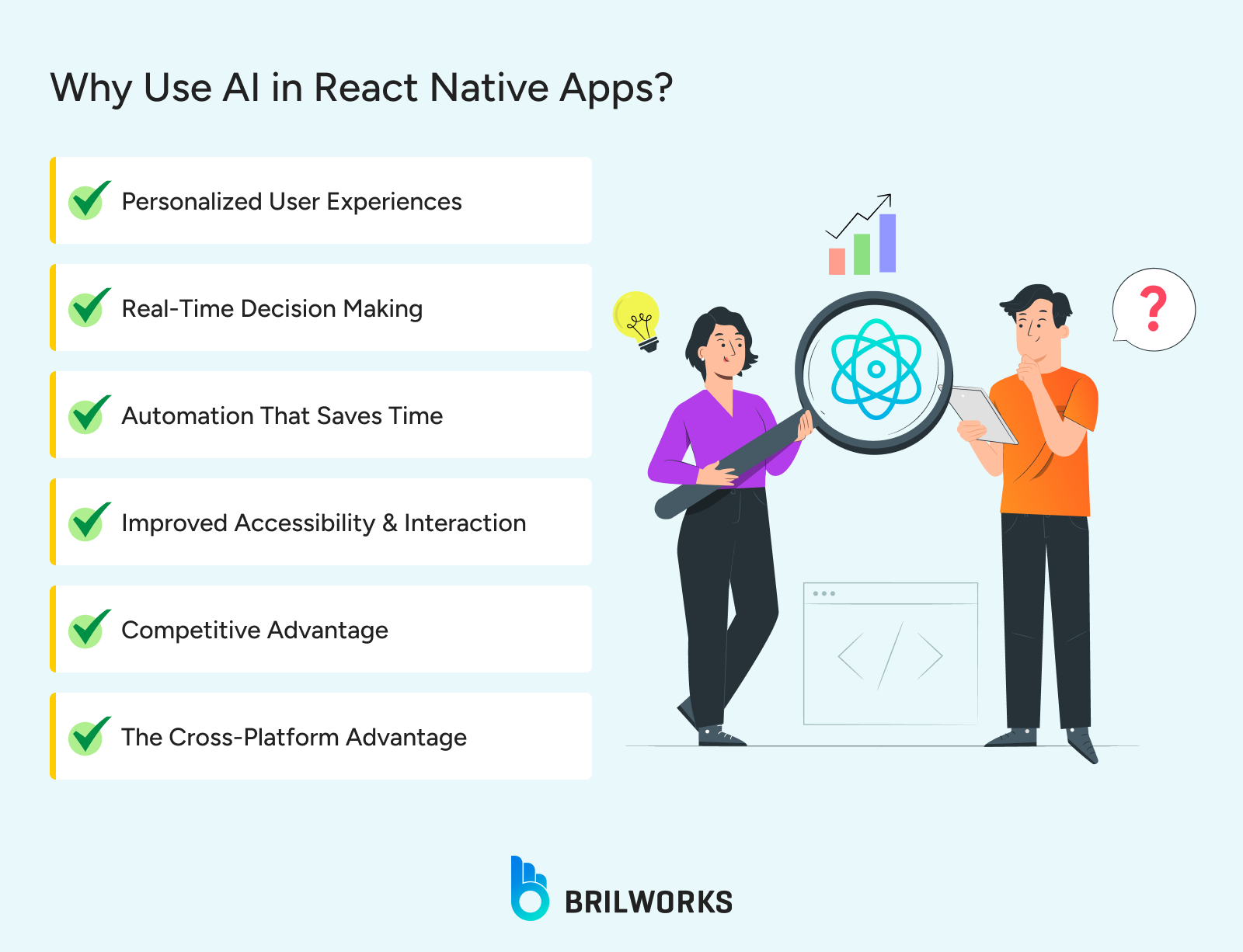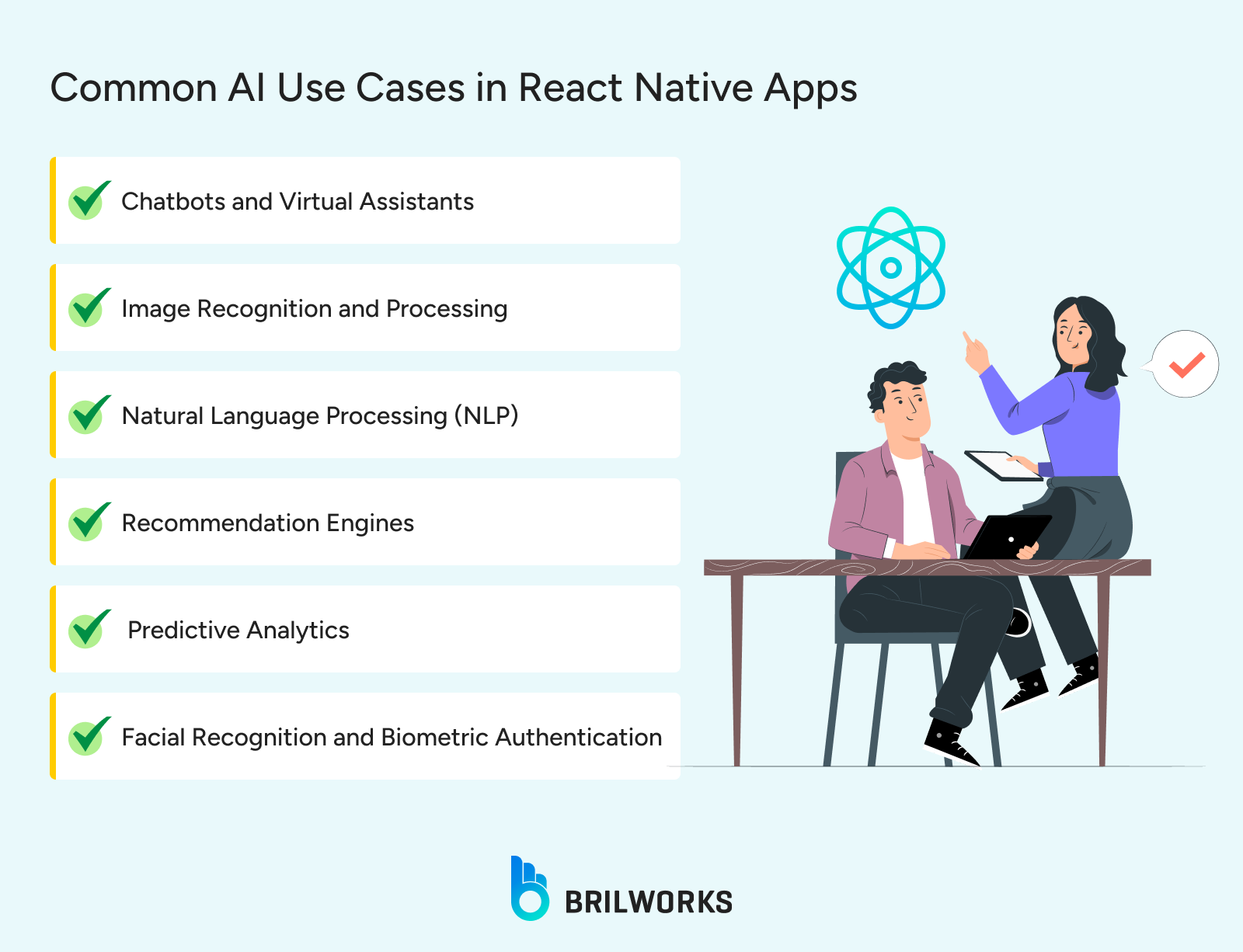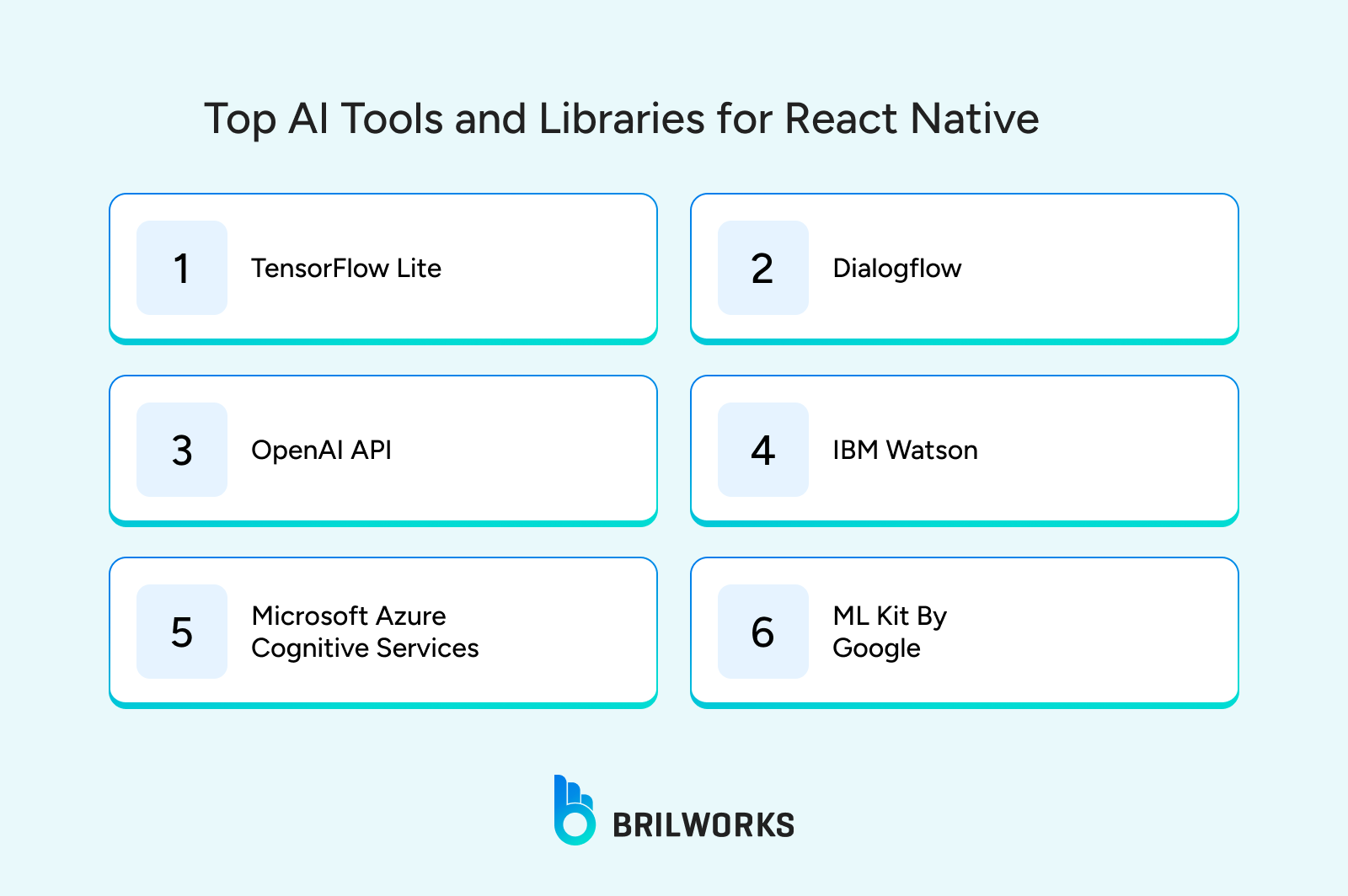COOPERATION MODEL
ARTIFICIAL INTELLIGENCE
PRODUCT ENGINEERING
DevOps & Cloud
LOW-CODE/NO-CODE DEVELOPMENT
INDUSTRY
FRONTEND DEVELOPMENT
CLOUD DEVELOPMENT
MOBILE APP DEVELOPMENT
LOW CODE/ NO CODE DEVELOPMENT
EMERGING TECHNOLOGIES








The popularity of Artificial Intelligence, or AI, in mobile apps has grown rapidly. In 2024 alone, over 4,000 new AI-powered mobile apps were launched, showing both developer and consumer interest. [Source: Backlinko]
According to industry projections, the global market for AI-based mobile apps is expected to exceed $2 billion by the end of 2025.
At our mobile app development company, we have seen AI evolve from a supporting feature to a core part of mobile applications. Integrating AI in your React Native app can enhance personalization, speed, and engagement, making your app smarter and more adaptive.
In this guide, we cover how AI integration works in React Native, including common use cases, the top tools, coding setup, and tips to overcome challenges. Whether you want to add a chatbot, voice assistant, or predictive analytics, this step-by-step guide will help you get started.
Ready to elevate your mobile app with AI? Our expert team specializes in React Native app development, seamlessly integrating cutting-edge AI features to create smarter, more engaging user experiences. Contact us today to transform your ideas into powerful, AI-driven apps!
Before jumping into integration, it’s worth understanding why AI is important in React Native apps. AI goes beyond adding features; it changes how users interact with your app.

Here are the main reasons to include AI in your React Native app:
AI tailors content and interactions based on user behavior and preferences. Whether it’s suggesting music, curating shopping feeds, or customizing workouts, personalization keeps users engaged and coming back.
AI allows your app to analyze data instantly, offering smarter suggestions and immediate responses. For example, a fitness app can adjust routines based on user performance history.
Chatbots can handle support queries, and AI can schedule tasks or send reminders automatically. This reduces repetitive work and improves user efficiency.
Voice commands, image recognition, and natural language processing allow users to engage with apps in ways that go beyond taps and swipes, making your app more interactive.
AI enables features that improve user experience, making your app stand out in a crowded market.
React Native combines JavaScript with near-native performance across Android and iOS. Integrating AI adds intelligence to your cross-platform app, giving both efficiency and advanced functionality. Learn more in our guide on cross-platform app development frameworks.
AI is not limited to chatbots or voice assistants. It powers a range of features that enhance usability, engagement, and real-world problem solving.

AI chatbots can handle customer queries, onboard users, and assist with transactions without human intervention. ChatGPT’s launch in 2022 showed the growing adoption of conversational AI.
AI is crucial in healthcare, retail, and AR applications. For instance, users can scan products or objects for instant results. In AR experiences, AI ensures filters or effects are applied accurately. Explore augmented reality (AR) in your mobile app for more details.
NLP allows apps to understand and respond to human language. It’s essential for voice commands, transcription, translation, and sentiment analysis.
AI-driven recommendation engines personalize content for users, as seen in apps like Netflix and Spotify. AI analyzes behavior patterns to suggest products or media efficiently.
AI can predict user behavior, forecast demand, or identify potential churn, helping apps make proactive and smarter decisions.
AI enhances security through facial recognition or biometric verification, offering an easier alternative to passwords or PINs.
For a detailed overview, see Artificial Intelligence (AI) in mobile apps.
Using the right tools makes AI integration simpler. React Native has an active community offering libraries that support AI functionality.

Optimized for mobile, TensorFlow Lite runs ML models on-device and supports image classification, object detection, and custom trained models.
Dialogflow offers NLP capabilities for chatbots and voice assistants. It integrates with React Native through REST APIs or third-party wrappers.
Integrate ChatGPT-powered conversational agents, writing assistants, or text generation tools directly into your app. Ideal for text-based AI features.
Watson APIs support speech-to-text, tone analysis, and visual recognition. It’s enterprise-ready and can be integrated via HTTP requests.
Azure provides vision, speech, language, and decision-making APIs. Prebuilt APIs for face detection and NLP make integration straightforward.
ML Kit supports text recognition, barcode scanning, and face detection. It works with React Native using native modules or bridges.
More details can be found in Top React Native App Development Tools for Developers.
For faster integration, you can use pre-built SDKs:
react-native-tensorflow: On-device ML model support
tfjs-react-native: TensorFlow.js for React Native
react-native-ml-kit: Google ML Kit integration
react-native-openai: Simplifies OpenAI API implementation
These SDKs reduce development time and help you integrate robust AI features efficiently.
Follow these steps to implement AI features:
Decide the feature you want, such as:
Chatbot for customer support
Recommendation engine
Image classification tool
Voice-to-text or translation feature
Most AI services use APIs. Install an HTTP client:
npm install axios# or
yarn add axiosFor on-device models, install the required native modules.
|
Use Case |
Recommended API |
|
Chatbot / Virtual Assistant |
Dialogflow, OpenAI (ChatGPT) |
|
Image Recognition |
Google Vision API, Azure Computer Vision |
|
NLP / Translation |
IBM Watson NLP, Google Cloud Translation |
|
Text Generation / Summarization |
OpenAI API |
|
Facial Recognition |
Microsoft Azure Face API, AWS Rekognition |
Example of a ChatGPT chatbot:
import React, { useState } from 'react';
import { View, TextInput, Button, Text } from 'react-native';
import axios from 'axios';
const Chatbot = () => {
const [input, setInput] = useState('');
const [response, setResponse] = useState('');
const handleSend = async () => {
try {
const res = await axios.post('https://api.openai.com/v1/chat/completions', {
model: 'gpt-3.5-turbo',
messages: [{ role: 'user', content: input }],
}, {
headers: {
'Authorization': `Bearer YOUR_API_KEY`,
'Content-Type': 'application/json',
},
});
setResponse(res.data.choices[0].message.content);
} catch (error) {
console.error('API Error:', error);
setResponse('Oops! Something went wrong.');
}
};
return (
<View style={{ padding: 20 }}>
<TextInput
placeholder="Ask me anything..."
value={input}
onChangeText={setInput}
style={{ borderWidth: 1, marginBottom: 10, padding: 8 }}
/>
<Button title="Send" onPress={handleSend} />
<Text style={{ marginTop: 20 }}>{response}</Text>
</View>
);
};
export default Chatbot;Test for:
Unexpected or malformed inputs
Response time and latency
Accuracy and relevance of AI outputs
Display loading indicators while AI processes requests
Handle API timeouts gracefully
Provide fallback responses if AI fails
A smooth user experience ensures AI features feel natural and reliable.

Heavy models may need cloud processing. Use lightweight models or offload complex tasks to servers.
Some libraries are platform-specific. Use wrappers or custom modules to bridge Android/iOS features.
Optimize caching, background threads, and API calls to maintain responsiveness.
Comply with GDPR, CCPA, and HIPAA. Implement encryption, tokenized access, and transparent user consent. For reference, see HIPAA-compliant app development.
Start with cloud-based APIs like OpenAI, Google Cloud, or Hugging Face
Keep models lightweight for on-device processing
Optimize the bridge between React Native and native modules
Cache results where real-time processing is not necessary
Prioritize user privacy and permissions from the start
These strategies can also help shorten your mobile app development timeline.
AI in React Native is no longer a trend. Features like chatbots, voice interfaces, personalized recommendations, and predictive analytics can transform your app.
Doing it right requires the proper tools, optimized workflows, and strong privacy practices. Our team specializes in building secure, scalable, and intelligent mobile apps.
Get in touch with our team today to turn your AI-powered vision into reality.
Yes, you can. AI integration can be added to both new and existing React Native apps using APIs, SDKs, or by building custom features, depending on the use case.
Not necessarily. Many AI tools offer pre-built APIs that don’t require deep ML knowledge. However, a basic understanding of how AI works can help you make smarter integration choices.
Some common features include chatbots, voice assistants, recommendation systems, predictive analytics, and image recognition—all of which can be built into a React Native app.
Popular options include TensorFlow.js, ML Kit, Dialogflow, and cloud APIs from OpenAI, Google Cloud, and AWS. Your choice depends on your app’s needs and the type of AI integration you’re planning.
It depends on the complexity. Simple AI features like chatbots can be affordable using APIs, while custom models and large-scale implementations can require a higher budget.
Get In Touch
Contact us for your software development requirements
Get In Touch
Contact us for your software development requirements